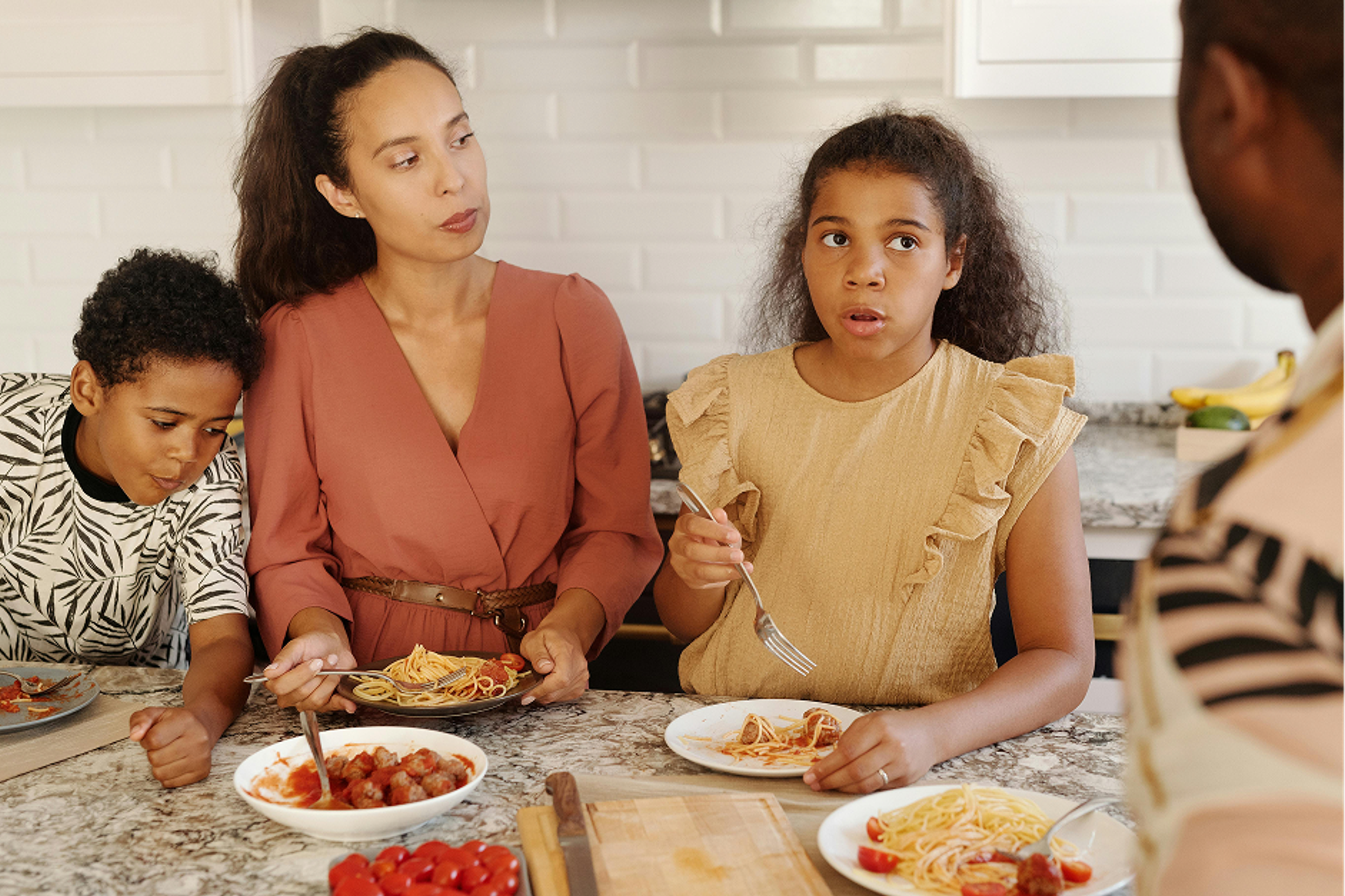


Imagine this: You have to face the most terrifying challenge your brain can imagine, and the people you love most are the ones forcing you to do so. You have to do this every day, several times a day, with no end in sight.
For someone recovering from an eating disorder, that’s what meals can feel like. It might be hard for anyone on the outside to understand, but when you’re in the grip of an eating disorder, meals and snacks can be the most mentally, emotionally, and physically demanding part of the day. This makes the kitchen table a scary and stressful place not only for the person struggling, but also for those supporting them.
And for family members who are concerned about a loved one, it can make the prospect of intervening and providing eating disorder meal support feel completely overwhelming. If you’re in that situation, you’re not alone: it’s extremely hard to know how to help someone with anorexia eat—or any other eating disorder for that matter, since restricting food intake is a core component of all eating disorder diagnoses. “Mealtimes can feel like a war zone,” says registered dietitian Bryn Miller, LPC, CEDS-C, EFFT.
The good news is that there are tangible things you can do to make eating easier for someone struggling with an eating disorder, and help bring some peace back to the table.
Why are meals so hard in eating disorder recovery?
There’s no doubt that meals can bring up a variety of negative emotions for people with eating disorders. Research indicates that those affected by an eating disorder associate mealtimes with guilt, confusion, fear, and distress, and that people with anorexia experience an increase in pre-meal anxiety.
“No matter what type of eating disorder you have, there's going to be a lot of fear around food. Knowing that we have to eat, ideally, three meals (especially breakfast) and two to three snacks a day to get all of our nutrition in—that's a lot of times for someone to face the fear,” explains Equip dietitian Dani Castellano, RD, CEDS. “That's going to bring up a lot of distress.”
This anxiety can manifest in a number of observable ways, including fidgeting, becoming agitated, not engaging in conversation, and avoiding eye contact, says Lauren Chaffin, MS, RD, LD, a registered dietitian specializing in eating disorders. It might also cause a person to turn to eating disorder behaviors, like food rituals or hiding food. In other cases, she says, someone may struggle to ignore the ever-louder voice of their eating disorder, leading to them bottling up and pushing down their feelings.
When you're wondering how to help someone with anorexia eat (or any other restrictive eating disorder), keep in mind that mealtimes can cause physical discomfort, too. Our digestive system is a smooth muscle, and when someone isn't using it in the way it's usually used—because they're restricting or bingeing and/or purging—it's not going to be as strong as it needs to be, Castellano explains. This can cause great discomfort when someone in recovery starts consuming consistent, adequate nutrition on a regular basis, especially since many patients need to eat more than they are used to eating, she adds.
With all of this happening inside your loved one, it can be extremely difficult for family members to know how to provide eating disorder meal support. But there are two pieces of good news that might provide some comfort:
First, meals typically get easier over time with support, consistency, adequate caloric intake, intentional meal planning, and (when needed) weight gain. “A hungry brain is operating as a more primal brain, with the amygdala—or fear center—taking prominence,” says registered dietitian Elyssa Toomey, RDN, CED-S. “As nutrition rehabilitation progresses, one is more able to access the prefrontal cortex of the brain, which is responsible for executive functioning and reasoning.” This, she says, helps make mealtimes calmer.
And second, there are concrete things you can do to make meals and snacks easier for your loved one—and, in turn, for your entire family.
Tips for providing eating disorder meal support
Eating disorder recovery isn’t one-size-fits all, and you know your child better than anyone else. The strategies below are expert-recommended ways to help make mealtimes more manageable, but you may need to pick and choose to find the ones that work best for you, your loved one, and your family.
1. Choose regulating pre-meal practices
Soothing the nervous system before sitting down to meals can be very helpful. “This means everyone begins meals in the most emotionally regulated place possible, instead of a state of anxiety or numbness,” explains registered dietitian Caroline Young.
Some pre-meal regulating practices include:
- Connecting with nature (like taking a walk outside)
- Taking several rounds of extended exhale breaths, which research suggests activates the parasympathetic (aka “rest and digest”) nervous system, prompting relaxation
- Using cold water or an ice pack on your face or hands
- Listening to music, which may help with pre-meal anxiety as well as post-meal mood in recovery
- Doing progressive muscle relaxation, where you clench each muscle really tightly and then release it, gradually moving from head to toes
2. Try pre-meal processing
Give your loved one space to share how they’re feeling before eating. “Discuss and name any food-based anxiety. Perhaps a particular food is a challenge, or they’re feeling anxiety because of what else they’ve consumed today,” Toomey suggests. “Reassure your loved one that the foods are safe, and remind them to try and separate meal events: What we ate previously or plan to eat later should have no impact on what we’re having now.” She also suggests taking a few collective slow breaths and setting intentions for the meal, like “Stay engaged” or “Taste the food.”
3. Use healthy distraction
Though it might feel counterintuitive (shouldn’t we face this head-on?) sometimes distraction is your best friend at the table, especially early in recovery. “A lot of times, the brain can't focus on two things at once,” says certified eating disorders dietitian Iris Epstein, RD. Because of this, it can be helpful to find ways for your loved one to keep their mind off of eating disorder thoughts during meals. Healthy mealtime distractions can include:
- Playing board games
- Telling riddles or jokes
- Playing 20 Questions
- Doing a crossword puzzle or Wordle
- Reading a book
- Playing with a figure toy
- Drawing
- Listening to music
- Listening to a podcast
- Watching a favorite TV show
- Talking

4. Foster a safe environment
Eating disorder meal support begins before you sit down. Consider if there's anything overstimulating or negatively distracting in your dining area, such as a fast-paced movie on TV or homework to be done. Also take note of who is around, because certain people may make your loved one feel more or less comfortable eating. “It already feels so wrong to them to be facing the food all of the time. So if we have an environment that feels additionally difficult on top of that, that can make it feel impossible to eat,” Castellano says. “Instead, create a space where you can lessen the distress and difficulty even one percent so they can tackle what's in front of them.” If times you can't control the environment, check out these tips for meal support while traveling.
5. Increase external cues of safety
Having a physical object or sensory experience that provides comfort can make a big difference during mealtime, reminding the person struggling that they’re safe and helping them regulate their nervous system. Young suggests clients bring items to meals that evoke a sense of peace—seashells from a beach trip, a calming essential oil, an affirmation, a cherished photo, a piece of jewelry from a loved one—and to look at, listen to, smell, or touch it when necessary. Having pets nearby can also create an internal sense of safety for the whole family.
Toomey says homemade placemats can also go a long way. “They can be full of drawings, clippings from magazines, quotes, motivations, goals—whatever will help keep one focused on a peaceful state of being during the meal,” she says. These coping cards, which you can print or save to your phone, can also be good in-the-moment reminders of safety.
6. Use mindfulness while eating
Another way to help manage the nervous system throughout meals is by using mindfulness tools—like breathing techniques, sense engagement, and grounding practices—which can help move us out of our heads and into our bodies.“When my clients are struggling in meal sessions, I ask them to pause and name five things they can see, four things they can touch, three things they can hear, two things they can smell, and one thing they can taste,” Young says. “I ask them to feel their feet’s connection to the floor and their body’s connection to their chair. After doing this, they’re typically able to re-center and continue the meal with less distress.”
7. Keep the conversation light
Talking about food, weight, bodies, or the eating disorder is off the table during meals and snacks. “The support person should always avoid comments around the type of food, the meal itself, the quantity, or anything related to the eating disorder,” Chaffin says. “Basically, no attention should be drawn to the food a person is eating, whether seemingly positive or negative.” For a deeper dive into what to say and what not to say, you can explore this guide for avoiding triggers.
By shifting the conversational spotlight from food and the eating disorder to other topics, the meal becomes more endurable for the person struggling, and prevents the eating disorder from latching onto something said and twisting it in a harmful way. That said, not every non-food-topic is fair game—it’s also important to keep conversations light. Meals aren’t for discussing hard family issues or emotionally charged subjects. Instead, try talking about movies, books, or travel, or using conversation cards to explore interesting, unexpected topics.

8. Communicate clearly
Before meals, it can be helpful for everyone to clearly communicate their needs. “Both the person supporting and the person struggling should be open to conversations around what is needed and what to do when those needs are unable to be met, such as getting more support or seeking help from their treatment team,” Chaffin says.Communication can also come in handy during the meal if things become too overwhelming. “Often when someone is struggling to eat their meal, a loved one focuses on the specifics of the food, like how many more almonds they need to eat,” Toomey says. “This isn’t helpful. Instead, pause and say to your loved one, ‘It seems like you’re having a really hard time, do you want to talk about it?’ This can diffuse the tension and hopefully get to the root of the problem.”It can also help to validate how they're feeling by saying something like, 'This is very hard work you're doing, and I'm here to support you in getting through this,' Castellano advises.
Lastly, if you're not sure what would be most helpful for your loved one, ask. “People avoid asking because they’re trying to know it all or do all the right things,” Castellano says. That puts a lot of unnecessary pressure on you, and prevents you from finding out what your loved one might really need or want. Nobody can know everything—so ask.
9. Have compassion
Remember that your loved one is not their illness. “We can all behave in ways that aren’t totally ‘rational’ or in alignment with our values when we’re under extreme duress, even if that duress doesn't make sense to someone else,” Miller says. Expect resistance, and try not to personalize it. “It's the eating disorder talking,” Epstein says.
Instead of arguing back or becoming forceful, speak with compassion. Depending on your loved one and your relationship with them, Epstein advises saying things like:
- “I'm here to keep you safe.”
- “I know this is hard. You don't have to like this, but remember what our goal is.”
- “Let's take a bite together.”
- “Take your finger and poke [the food]...Good. Now, try to put a little on your fork...That's it. Now can you put a little in your mouth?”
- “We both hate this eating disorder, but I know you can do it.”
- “You did something really hard, and I applaud you for it.”
- Nothing. Just sitting in silence if they're slowly eating.
10. Be intentional after meals
One of the hardest parts of a meal is the period afterward, since this is when the relentless eating disorder voice loves to berate the sufferer about what they ate, evoking shame and guilt. Research shows that staying occupied and supported after meals can help soften these hard thoughts and emotions, and prevent compensatory behaviors. “After a meal or snack, it’s important to stay present with the person struggling,” Chaffin says. “Keep the conversation going, play a game, watch TV, or go outside for some fresh air together.”
11. Take care of yourself
“Providing eating disorder meal support can be challenging, so do your best to get rest, food, and your own support,” Toomey encourages. “You can't pour from an empty cup, so be sure to prioritize your own self-care.” You may benefit from seeing your own therapist or joining a support group, or, if you’re in treatment at Equip, sharing your struggles with your family mentor. “Talking with family mentors can be so helpful because they've had that lived experience,” Castellano adds.
- Monaghan, Margaret, and Louise Doyle. “'It stopped you thinking about food' - The experiences of mealtimes and attending a post-meal support group for young people with anorexia nervosa.” International journal of mental health nursing vol. 32,1 (2023): 128-138. doi:10.1111/inm.13068
- Gardner, Lucy and Hayley Trueman. “Improving mealtimes for patients and staff within an eating disorder unit: understanding of the problem and first intervention during the pandemic—an initial report.” BMJ open quality vol. 10,2 (2021): e001366. doi:10.11
- Lloyd, E Caitlin et al. “Associations between mealtime anxiety and food intake in anorexia nervosa.” The International journal of eating disorders vol. 54,9 (2021): 1711-1716. doi:10.1002/eat.23589
- Komori, Teruhisa . “The relaxation effect of prolonged expiratory breathing.” Mental illness journal vol. 10,1 (2018): 7669. doi: 10.4081/mi.2018.7669
- Gerritsen, Roderik J S and Guido P H Band. “Breath of Life: The Respiratory Vagal Stimulation Model of Contemplative Activity.” Frontiers in Human Neuroscience vol. 9, 12 (2018): 397. doi: 10.3389/fnhum.2018.00397
- Meneguzzo, Paolo et al. “Tuning in to recovery: influence of music on emotional well-being during mealtime in inpatient facilities for eating disorders.” Journal of eating disorders vol. 12 (2024): 7. doi: 10.1186/s40337-024-00970-9







